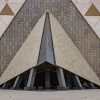Islamic Cairo and its Religious Significance
Introduction
Islamic Cairo stands as a testament to centuries of faith, artistry, and architectural brilliance. Nestled in the heart of Egypt’s bustling capital, this historic district is more than just a collection of ancient structures; it’s a living, breathing chronicle of Islamic civilization. Here, towering minarets pierce the skyline, intricate carvings adorn mosque walls, and the echoes of the past blend seamlessly with the rhythms of modern life.
Founded during the Fatimid era in the 10th century, Islamic Cairo became the epicenter of religious scholarship and culture, a reputation it still holds today. Its labyrinthine streets house some of the world’s most celebrated Islamic landmarks, from Al-Azhar Mosque—an enduring symbol of learning and spirituality—to the grand Sultan Hassan Mosque, an architectural marvel of the Mamluk period.
Islamic Cairo and its Religious Significance In this article, we’ll explore the profound religious significance of Islamic Cairo, unraveling the stories behind its mosques, madrassas, and shrines. Whether you’re a history enthusiast, a spiritual seeker, or a curious traveler, Islamic Cairo offers an unparalleled journey into the soul of Islamic heritage.
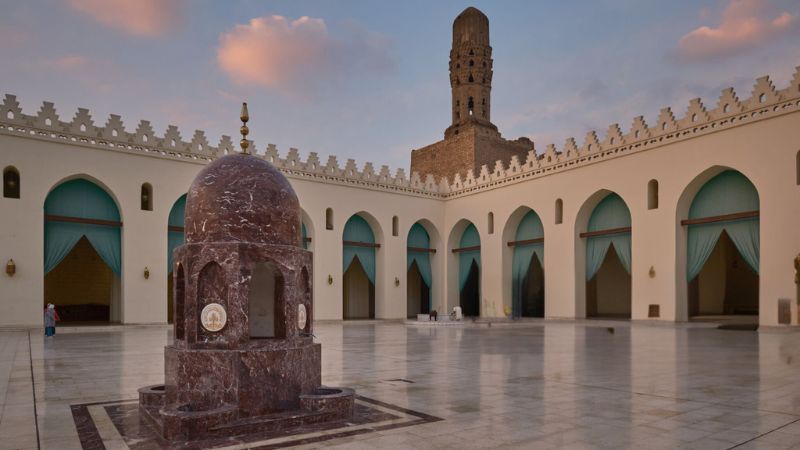
The Historical Emergence of Islamic Cairo
Islamic Cairo was born out of a vision to establish a city that would serve as a beacon of Islamic scholarship, governance, and culture. This vision became a reality in 969 CE, when the Fatimid Dynasty founded Al-Qahira, or Cairo, as their capital. From its earliest days, the city was designed to reflect the spiritual and intellectual aspirations of the Islamic world.
Foundation and Fatimid Era
The Fatimids, a Shi’a Islamic caliphate, established Cairo not just as a political capital but also as a cultural and religious hub. They built Al-Azhar Mosque, which quickly became a center of learning, attracting scholars from across the Islamic world. This foundational period set the stage for Cairo’s enduring legacy as a city of faith and knowledge.
Transformation Through the Ayyubid and Mamluk Dynasties
In the 12th century, Salah ad-Din (Saladin) brought the Ayyubid dynasty to power, shifting Cairo toward Sunni Islam and fortifying it with structures like the Citadel. The Mamluk period that followed marked a golden age for Islamic Cairo, with an explosion of architectural and cultural achievements. The city saw the construction of grand mosques, madrassas, and mausoleums, many of which still stand today as iconic symbols of Islamic art and devotion.
A Hub of Islamic Scholarship and Trade
Over the centuries, Cairo’s prominence grew, not only as a spiritual center but also as a nexus for trade and education. Al-Azhar University evolved into one of the most respected institutions of Islamic scholarship in the world, while the city’s bazaars and caravanserais buzzed with merchants exchanging goods and ideas.
Islamic Cairo’s layered history is evident in its streets, where every corner reveals a piece of its past. From the intricate carvings on mosque walls to the bustling souks that have thrived for centuries, the district tells a story of resilience, faith, and ingenuity. Exploring these origins is key to understanding why Islamic Cairo remains a spiritual and cultural heart of the Islamic world.
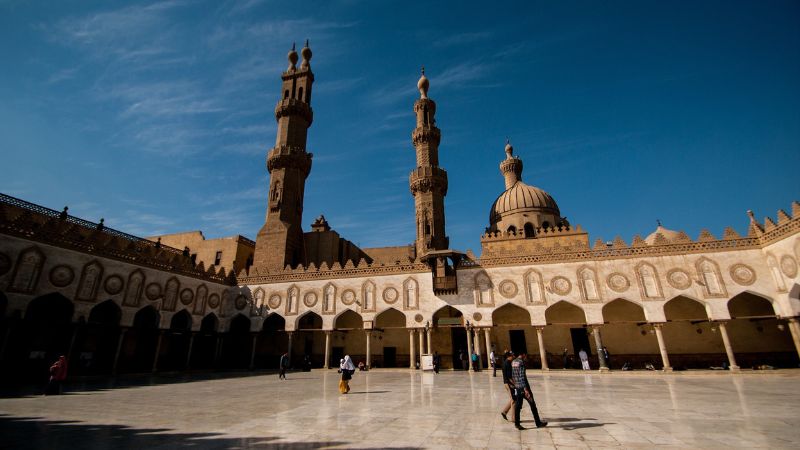
Religious Significance of Iconic Mosques
Islamic Cairo is home to some of the most significant mosques in the Islamic world, each carrying profound religious, historical, and architectural importance. These sacred spaces are not only places of worship but also symbols of the city’s enduring spiritual legacy.
Al-Azhar Mosque: The Beacon of Islamic Scholarship
Founded in 970 CE by the Fatimids, Al-Azhar Mosque is more than a place of prayer—it’s a global institution of Islamic learning. Its attached university has shaped Islamic thought for over a millennium, attracting scholars and students from around the world. Walking through its courtyards, you can feel the weight of centuries of intellectual discourse, making it a must-visit for those interested in the interplay of faith and education.
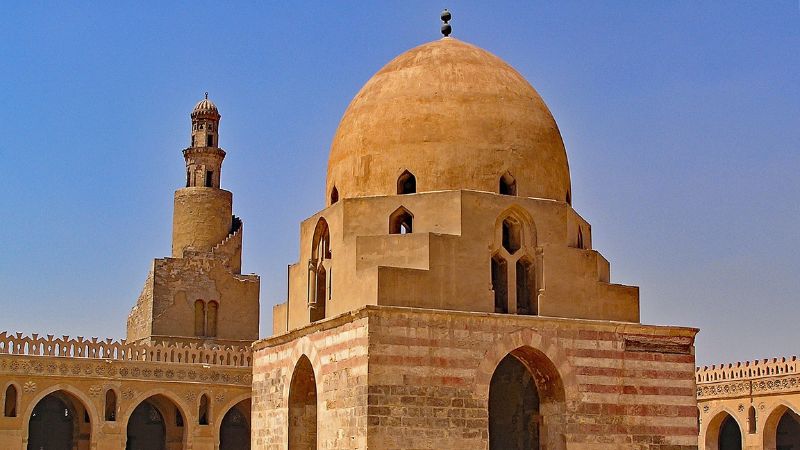
Mosque of Ibn Tulun: A Glimpse into Abbasid Influence
Built in the 9th century, the Mosque of Ibn Tulun stands as one of the oldest and most well-preserved mosques in Cairo. Its vast, open courtyard and unique spiral minaret showcase Abbasid architectural influence, and the simplicity of its design reflects a profound sense of spiritual focus. Visitors often remark on the serenity they feel within its walls, making it a deeply moving experience.
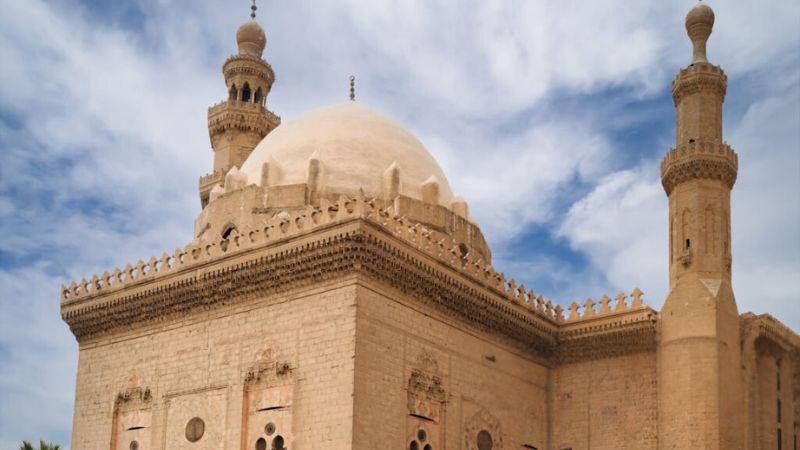
Sultan Hassan Mosque: A Monument of Mamluk Grandeur
The Sultan Hassan Mosque and Madrassa, constructed in the 14th century, is a masterpiece of Mamluk architecture. Its towering walls and ornate interiors were designed to inspire awe, symbolizing the power and piety of its patron. As you step inside, the interplay of light and shadow through its domes and arches creates an atmosphere of reverence and wonder.
These mosques are more than historical landmarks—they are living testaments to Cairo’s role as a spiritual and cultural capital. Their enduring presence invites visitors to connect with centuries of faith and devotion.
Exploring the Madrassas, Mausoleums, and Shrines
Beyond its grand mosques, Islamic Cairo is home to countless madrassas, mausoleums, and shrines, each with its own story and significance. These sites offer a deeper understanding of the city’s spiritual and educational heritage.
Madrassas: Centers of Islamic Education
Madrassas, or Islamic schools, were integral to Cairo’s development as a hub of scholarship. Structures like the Madrassa of Sultan Qalawun demonstrate the importance of combining education with devotion. These institutions nurtured scholars who contributed to Islamic jurisprudence, philosophy, and science, leaving a legacy that continues to inspire.
Mausoleum of Imam al-Shafi’i: A Sacred Pilgrimage Site
Imam al-Shafi’i, a revered Islamic scholar and the founder of the Shafi’i school of thought, is buried in Islamic Cairo. His mausoleum is a site of pilgrimage, drawing visitors who seek blessings and inspiration. The intricate calligraphy and geometric designs adorning the tomb reflect the deep respect and love the community holds for this influential figure.
Shrines of Sufi Saints
Cairo is also a center for Sufi spirituality, with shrines dedicated to saints who emphasized love, devotion, and mysticism in their approach to Islam. Visiting these shrines offers a glimpse into the rich tapestry of Islamic practices and beliefs that coexist in the city. The energy at these sites, especially during religious celebrations, is both vibrant and contemplative.
These landmarks provide a window into the diverse expressions of faith that have shaped Islamic Cairo, making them essential stops for those seeking to understand its spiritual depth.

Cultural Practices and Ramadan in Islamic Cairo
Islamic Cairo is not only a historical treasure but also a living, breathing part of the city that thrives on cultural and religious practices, especially during Ramadan. The district becomes a focal point for celebrations, prayer, and community gatherings during this sacred month.
Taraweeh Prayers in Historic Mosques
During Ramadan, the mosques of Islamic Cairo come alive with the sound of Taraweeh prayers. Al-Azhar Mosque and the Sultan Hassan Mosque, in particular, host large congregations. The atmosphere is electric yet deeply spiritual, as worshippers gather to recite and reflect on the Quran.
Community Iftar Gatherings
Streets and courtyards transform into communal dining spaces where residents and visitors break their fast together. The generosity and sense of unity during these gatherings are heartwarming, offering a chance for travelers to connect with locals and experience the communal spirit of Ramadan.
Festivities and Decorations
Lanterns, or fawanees, illuminate the streets of Islamic Cairo, creating a magical ambiance. Markets like Khan El Khalili become even more vibrant, offering Ramadan sweets, decorations, and traditional crafts. The district becomes a sensory feast of sights, sounds, and flavors.
Ramadan in Islamic Cairo is a time when the district’s religious significance blends seamlessly with its cultural vibrancy, providing an unforgettable experience for visitors.
Navigating Islamic Cairo as a Visitor
Exploring Islamic Cairo requires both practical planning and cultural awareness to fully appreciate its depth and beauty. Here are some tips to make your visit memorable and respectful.
Best Times to Visit
To avoid crowds, plan your visits to mosques and landmarks early in the morning or later in the evening. This is especially important during Ramadan, when activity levels fluctuate throughout the day. Evenings are ideal for soaking in the district’s lively atmosphere.
Respecting Religious Customs
Islamic Cairo is a deeply spiritual place, so modest attire is essential. Women should cover their shoulders and knees, and men should avoid overly casual clothing. Be mindful of prayer times and avoid interrupting worshippers, particularly in mosques.
Engaging Local Guides
Hiring a knowledgeable guide can enrich your experience by providing historical context and lesser-known stories about the landmarks. Many guides specialize in Islamic Cairo and can tailor tours to your interests.
Exploring Beyond the Main Attractions
While landmarks like Al-Azhar and Sultan Hassan are unmissable, take time to wander the district’s narrow streets and discover hidden gems. Smaller mosques, local markets, and quiet courtyards often hold unexpected surprises.
With thoughtful preparation and an open mind, navigating Islamic Cairo becomes a journey into the heart of Egypt’s spiritual and cultural heritage.
Conclusion
Islamic Cairo is not just a destination—it’s an experience that connects the past with the present. Its mosques, madrassas, and shrines stand as monuments to centuries of faith and scholarship, while its vibrant streets and living traditions keep that legacy alive.
Whether you’re marveling at the intricate architecture of Sultan Hassan Mosque, reflecting at the mausoleum of Imam al-Shafi’i, or simply strolling through the bustling souks, Islamic Cairo offers moments of inspiration and wonder. It’s a place where history whispers from every corner and faith resonates in every stone.
As you explore this extraordinary district, let its stories deepen your appreciation for the richness of Islamic culture and the enduring beauty of Cairo’s spiritual heart.




